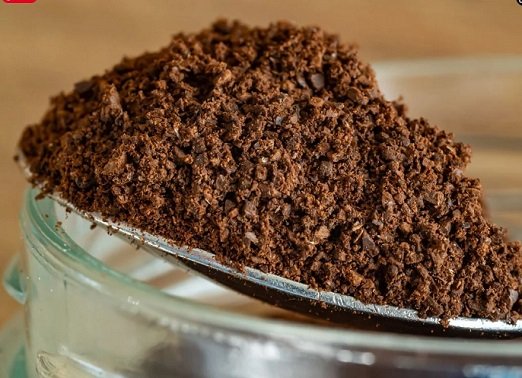Drinking coffee every day or several times a day will create a lot of coffee grounds. If you don’t want to have a lot of waste you should look for ways to make coffee grounds an important substance.
Yes, coffee grounds are good for Lemon trees as they have a lot of Nitrogen as well as other required elements in trace amounts.
With the right treatment, coffee grounds convert into a rich source of an important nutrient. One that lemon trees really do need for growth.
What Are Coffee Grounds?
Coffee grounds are what you are left with after using brewing coffee granules. But, it is a waste material that has no other purpose besides the one found in gardening.
Although these grounds cannot impart that much flavor anymore, they still contain relatively high levels of caffeine.
Caffeine is said to speed up growth in some plants while in others it leads to stunted growth. The latter applies to lemon trees. Because coffee grounds that are not properly decomposed will be high in caffeine.
Well composted coffee grounds are a positive fertilizing material for lemon trees if used in the appropriate quantity. Also, overuse of coffee grounds can be detrimental to lemon trees and other plants as well.
But, no worries, as you will soon get judgment about how much coffee grounds to give lemon trees.
More about this later on, let’s first discuss the advantages of coffee grounds for lemon trees and why you should use coffee grounds at all.
Are Coffee Grounds Good for Lemon Trees?
As odd as it may sound, coffee grounds are good for your lemon trees. But, beware as this only applies under one strict stipulation.
In order for coffee grounds to be beneficial to lemon trees, they must be very well decomposed. Fresh coffee grounds are high in caffeine and this compound could be detrimental to young or even established lemon trees!
When properly broken down, coffee grounds can make an excellent fertilizer that offers lemon trees a lot of benefits:
- Well composted coffee grounds are rich in Nitrogen and Calcium, two nutrients that lemon requires in large quantities.
- Also, it contains Selenium and a few other elements (in trace amounts).
- Coffee grounds naturally help to maintain the appropriate acidic level in which lemon trees grow best.
So, coffee grounds for lemon trees act as a growth aid and a soil acidifier. But they cannot be directly added to any plants let alone your trees. So if coffee grounds aren’t added directly to lemon trees, how are they used?
Let’s discuss how to prepare coffee grounds for lemon trees.
How to Prepare Coffee Grounds for Lemon Trees?
Disarming the caffeine from coffee grounds might not always be simple. The time taken to eliminate it may vary on a few factors. However, the process generally remains the same. So, these are the steps to take instead of throwing them in the bin!
Step 1: Collecting Coffee Grounds
You can choose to keep the coffee grounds in a box/container in which you can accumulate them. This helps to reduce the mess and number of containers you would use if keeping every day’s coffee grounds separate.
There are a few things to remember when storing and collecting coffee grounds.
- You have to let the coffee grounds cool before adding them to the rest of the coffee grounds. If you don’t, the heat could induce the growth of mold.
- Leave a clear path for air to circulate as this will speed up the degrading and releasing of the nutrients.
- Don’t by any chance mix fresh grounds with unused grounds!
Step 2: Composting Coffee Grounds with Other Compostable Objects
Coffee grounds are not capable of imparting positive effects to lemon trees immediately after use – when fresh. Adding them immediately to your compost heap is not a good idea either! Because of the caffeine, it contains you must keep it separate.
Usually, a time period of 6 months is necessary to help remove most if not all of the caffeine in used coffee grounds.
After which there is no reason to keep your coffee grounds away from your compost pile anymore. You can mix them into the rest of your compost and this will help to make it that much more fertile.
One thing you have to take great care of is making sure that your compost has the right amounts of green and brown material. Coffee actually has the designation of green material.
- Brown material consists of hay, straw, bark, and fallen fall foliage.
- Green material has coffee grounds, grass clippings, and food scraps.
In its full entirety, compost for lemon trees should consist of ⅔ brown material and ⅓ green material. Only with this composition will your compost make the best fertilizer for your lemon trees.
Step 3: Decomposing (Approximately 6 months)
In order for your coffee grounds to break down completely and release the nutrients within them, they must have enough time to completely disintegrate and mix with the other components.
Some gardeners say 2 to 3 months is ample time for the breakdown and leaching to occur. But, 6 months is a safer number. Seeing as caffeine is quite harmful to a lemon tree’s life cycle we suggest waiting it out for the full six months.
Continuous turning of the compost pile will accelerate activities that enrich compost due to material break-down.
Have a Meyer lemon tree that isn’t flowering? Here’s how to get your Meyer lemon tree to bloom.
How to Use Coffee Grounds as a Lemon Tree Fertilizer?
As mentioned coffee grounds can be added to your compost which will then be given to your lemon trees. But, if you don’t feel too enthusiastic about this idea there is an alternative.
Coffee grounds as a lemon tree fertilizer and finds use through direct application on the soil around your lemon tree. You just have to be careful to know how much to use!
Here are some points to remember when using coffee grounds on their own for your lemon tree.
- If you choose to scatter the coffee grounds undiluted, avoid making them touch the tree’s trunk.
- Place them at least 10 to 12 inches from the trunk of your lemon tree.
- Apply a layer of coffee grounds that is 1 or 2 inches thick (the lower number applies for younger/smaller lemon trees).
- Cover the grounds with a layer of soil. This helps to dilute any caffeine residue.
- Water it immediately to help nutrients and minerals leach out into the soil where roots can access it.
When Should I Apply Coffee Grounds to My Lemon Trees?
This is a common and obvious question for novice lemon tree growers. Applying coffee ground fertilizer could very well put the fate of your lemon tree at risk.
There are two particular ways that coffee grounds can be used on lemon trees. So, this means that there are different times as to when the grounds can be used.
- Apply coffee grounds in combination with compost in Spring. This is the main time where lemon trees show major growth and will need nutrients.
- You can apply coffee grounds that have undergone full rotting directly on lemon trees in any season. Pick whichever one suits the growth stages of your particular lemon tree variant.
Can Coffee Grounds Be Bad for Lemon Trees?
Coffee grounds may not pan out to be the hero everyone says they are. Certain scenarios make grounds a dangerous product that will negatively impact the growth, flowering, and fruiting of your lemon tree.
- All fertilizer can be good in moderation! The same applies to coffee grounds. In small amounts coffee grounds offer a positive impact to lemon trees. But in excessive amounts they can be more a danger than a help.
- Another risk arises if you use coffee grounds before all the caffeine has found its way out. In large amounts, caffeine can potentially kill worms. This is bad since worms do help to degrade matter and help to release minerals and nutrients.
- High doses of caffeine can also drastically reduce the number of pollination insects in the vicinity of your lemon trees. A shortage of pollinators can affect your tree’s ability to flower and produce lemons.
Conclusion
If you are not into using artificial fertilizers there may just be a natural substitute available. One that offers the right nutrients according to what your lemon tree needs for best growth and fruiting!
Conversion of coffee grounds into a fertilizer material that can help your lemon tree grow better is possible. Coffee grounds have a lot of Nitrogen, Selenium, and Calcium which are crucial in lemon trees.
Also, coffee grounds help to maintain acidic pH between 5.5 and 6.5
But, if you want to use coffee grounds you cannot use them fresh. Letting them sit for 6 months will remove caffeine which can be dangerous to your lemon trees. After this, you can add it to regular compost or add a layer to your soil.
Have foliage issues? Read reasons and solutions for brown lemon tree leaves.
FAQs
Yes, Meyer lemon trees will not mind if you add six-month-old coffee grounds into its soil. Besides letting out nutrients such as Nitrogen it will also help to maintain the acidic soil profile that lemon trees thrive in.
Yes, they can. But just do your research to make sure it won’t harm them instead. As mentioned before, Azaleas like coffee grounds when they are used properly.


